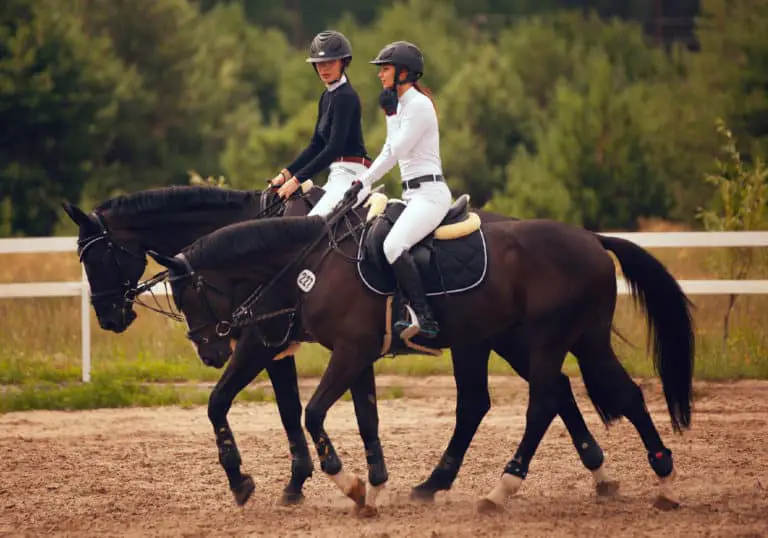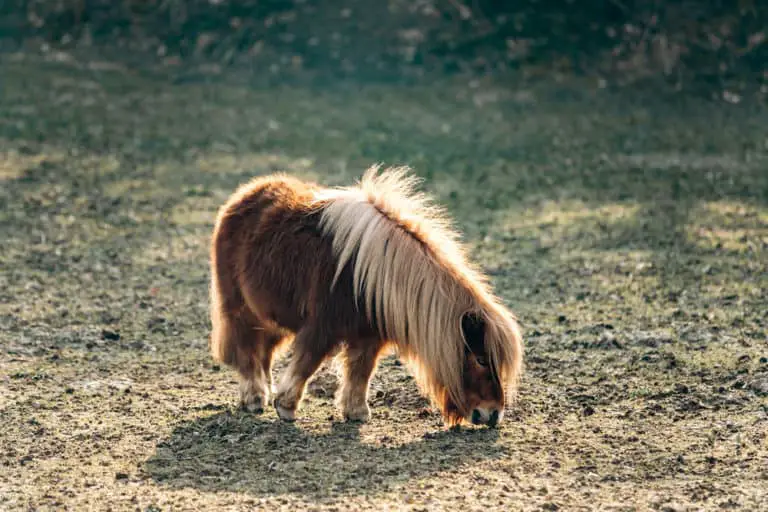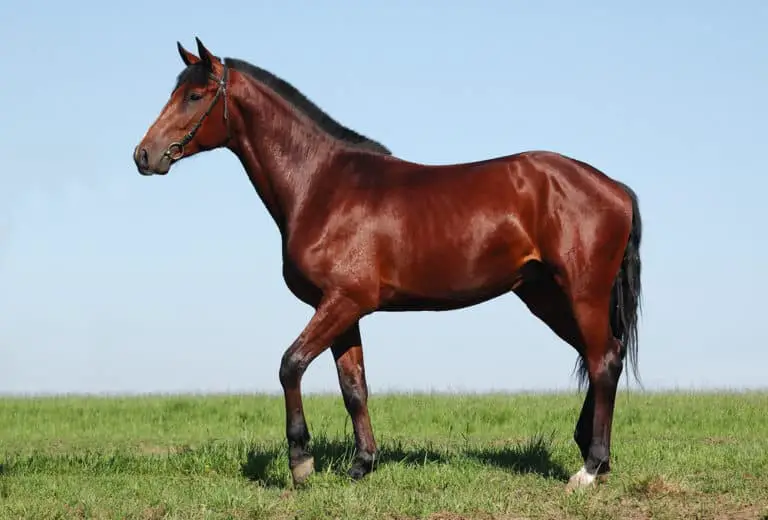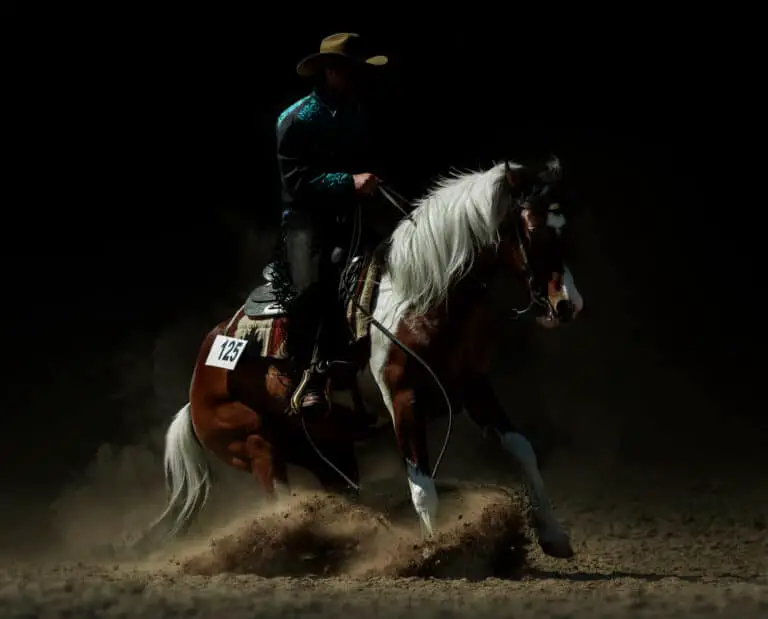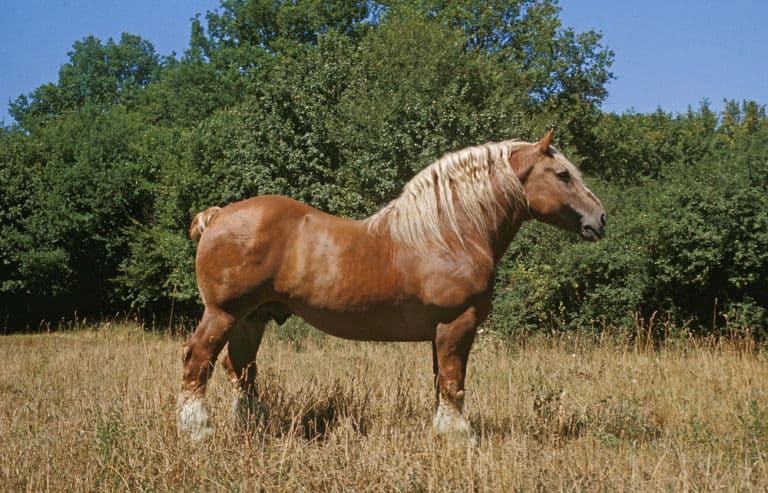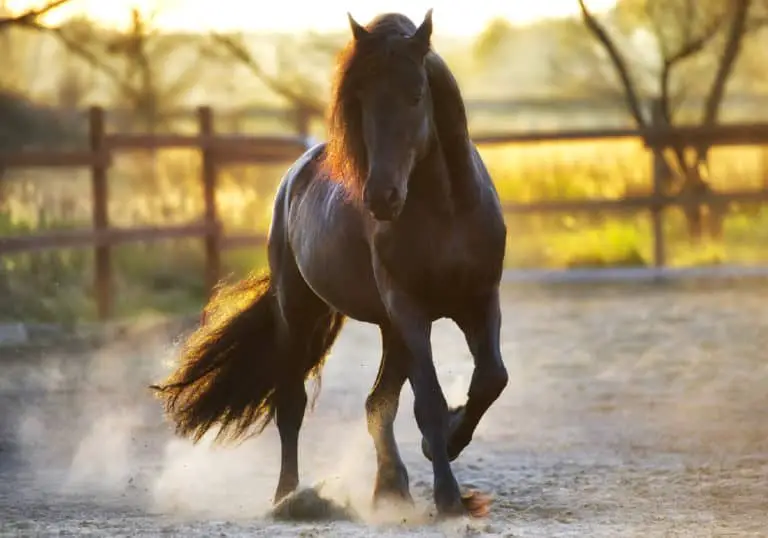Marwari Horse: Care, Cost & History (2026)
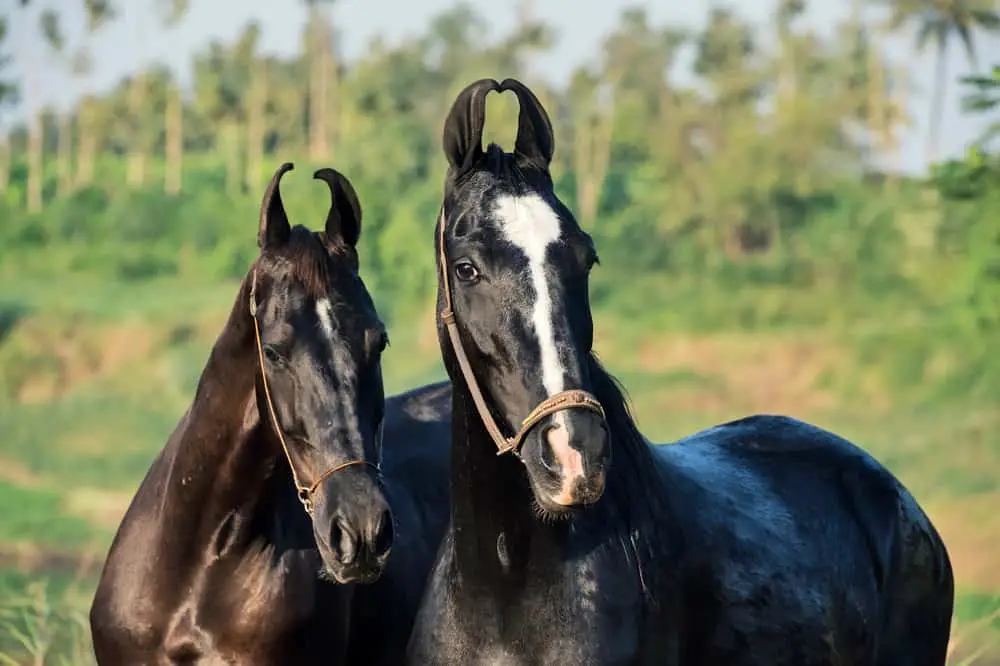
The Marwari horse is a unique and rare breed of desert horse originating from India. These rare horses are native to the picturesque landscape of Rajashtan and their main feature is their unusual inward-curved ears. This shape of ears is unique to the Indian horse breed and made them a desired export for horse enthusiasts from all around the world.
Breed: Marwari Horse
Adult Weight: 716 up to 881 lbs
Adult Height: on average 14.9 hands (56.8 inches)
Origin: Rajasthan, India
Use: Dressage, Show, Jumping, Dancing
Colors: All colors except white (Albino)
Features: Curled ears where the tips form an arch, small hooves
Lifespan: 25-30 years
Character: disciplined, easy-keepers, tough
Gait: Tactful, sure-footed, elegant
Best for: All level riders
- Characteristics
- Marwari Horse Care
- Marwari Horse History
- Modern Marwaris
- Cost and Ownership
- Buying a Marwari
- Similar Breeds
Marwari Horse Characteristics
The most distinctive feature of the Marwari horses is their curved ears. The special shape of their ears, formed like an arch where the tips of each ear tip each other, is one of the most important Marwari horse characteristics. (1)
Their other physical features, such as their well-defined body and the many coat colors of the Marwari horse are similar to that of other light horse breeds.
Overall the Marwari is a tall horse with small hooves, an arched neck, and a long back. The Marwari horse head can be described as slightly roman or chiseled.
Size
The withers of Marwari horses are well defined and the Marwari size is extensively documented by the Marwari Horse Society.
The precious Indian horses are approximately 14.9 hands (151.8 cm) high at the withers. (1) The female Marwari horse’s height is generally higher than that of Marwari males.
Females of this breed are taller, with an average height of 16.8 hands (170,48 cm) versus 16.5 hands (168.31cm) for male Marwari Horses. The neck of Marwari Horses is carried high.
Their height can be considered average to tall when one compares it with that of other light horse breeds.
Weight
When it comes to Marwari horse weight, the male specimens of the Indian horse breed are usually heavier than the females. The average body weight of a Marwari Stallion is 817 lbs or 371,57 kg. Females weigh 716 up to 881 lbs (325-400kg). (1)
One wouldn’t consider a Malani horse as specifically heavy, but they have strong and muscular bodies and especially their necks and chests are wide and broad.
They have a medium to long back and their muscular body is considered hardy and can withstand many difficulties while crossing difficult terrain. Marwari horses have an average weight for a light horse breed.
Colors
The Marwari Horse Society is very accepting when it comes to coat colors for the beautiful Marwari horse breed. Interestingly the Indian Breed Society has its own native color descriptions for the widely known coat colors.
Accepted Marwari horse colors are almost without exception and very colorful, therefore. The albino color, called Nukra, is the only exception and disqualification for the Marwari Horse Society. (1)
The most common and often observed coat colors are brown (Bhanwar), bay (Kumet), dark bay (Telia Kumat), piebald (Shah Ablak), skewbald (Lal Ablak), chestnut (Surang), dun (Champa), blue roan (Sanjab), grey (Shwet) and flea-bitten/dappled Grey (Kagra).
Rare Marwari horse colors that make a horse of this breed very valuable are grey, followed by piebald and skewbald as second choices.
Temperament
Marwari horse temperament is generally considered easy-going and calm, but there are some exceptions known since Marwari horses can also be hot-tempered once in a while. This might be a testimony of their past life as warrior horses of the Rajput warriors of the Marwar. (4)
Marwari horse behavior has been bred to be suitable for light draught purposes and dressage. The Marwari horse breed is a popular riding horse in India and shows how well-behaved these horses usually are. Marwari horses are kind, calm, and easy-keepers, with very few exceptions that could be expected with any breed of horse.
Marwari Horse Care
Marwari horses do not have specific requirements when it comes to horse care. Like any horse, it is preferably held in large and plain areas, where the animal can graze through the pasture.
As they are considered easy keepers, they will be accepting of a lot of environments since they are used to extreme weather and climate which could range between 4ºC-48ºC.
To ensure a long and healthy Marwari horse lifespan, you must care well for your horse which comes with a lot of time and commitment.
Diet and Nutrition
The Marwari diet is typical to a grazer and does not differ much from a common horse diet. The Marwari’s diet should consist of good-quality hay, grass, grains, and some fruit and veggies to offer your horse some variety.
If you compete with your Marwari in dressage or show, it is recommended that you supplement vitamins like probiotics, prebiotics, vitamins A, B, C, D, E, and K, and Omega-3 oils.
Your horse needs approximately 2% of its own body weight for its diet. Sunflower seeds in small amounts are also recommended to increase their protein levels. (2)
Health Problems
The rare desert horses of Rajasthan have been bred to be tough, solid, and healthy horses that are robust for their diverse uses. Marwari Horses were the first Asian horse breed where scientists mapped their whole genome. (3)
Marwari Horses can be prone to a few equine diseases like tetanus, arthritis, Equine rhabdomyelosis (Azoturia, distemper, equine influenza, colic, intestinal worms, laminitis, and rhino pneumonitis.
These diseases are not unique to the Marwari breed but can affect other horse breeds as well if you do not properly board and groom them. There are no specific genetic problems known to affect this breed.
Grooming
When it comes to Marwari grooming, the rare Horses are not too demanding. The coat, mane, and tail of this rare horse breed are easier to maintain compared to some other breeds and you should be fine with 2-3x/week of grooming.
Use a hoof pick to remove the packed dirt from the hoof of your Marwari every day and after every ride.
Brush the coat with a body brush to clean it from dust and small particles. Brushing will also strengthen the emotional relationship with a horse since this imitates social horse behavior.
Use a Curry Comb to remove more grave dirt and grease from the coat. Curry combs can also help to stimulate the blood flow of your horse. You should inspect the hooves regularly to prevent injuries or infections.
Marwari Horse History
The Marwari horse history is very old and rich. Not only before Christ but even in ancient Indian religions such as the Veda these horses are mentioned and play an important role throughout Indian history. The evolution of the Marwari horse until recent days is worth mentioning and exploring.
Origin
In the Veda, which is a linguistic and later written religious artifact from Hinduism, it is said that Lord Brahma, the creator of the universe, performed a yajna (an ancient ritual in Hinduism) from which ritual flames of a winged horse emerged. Archeological discoveries date the Indian horseback to 2500 BC. (4)
The specific Marwari horse origin is located in an area called Malani. Malani is part of the Barmer district of Marwar. Various villages in this district are said to be the true origin of the Marwari Horse. There are several famous and legendary Marwari horses mentioned in Indian history.
Historic Development
Especially during the English colonization of India, the Marwari Horse suffered neglect and negativity. The English did not like the unique horse breed and the breeding of Marwari horses declined considerably. (4)
Thoroughbreds and other European horse breeds replaced the native and local breed of Marwaris until the Independence of India has been declared and Indians took up breeding of this majestic horse once again.
The export of Marwaris has been forbidden for some decades. Nowadays, Marwaris are still rare, but international interest arises due to their unique looks.
Notable Marwari Horses
There is almost no animal in Indian history with the significance of horses. The famous Marwari horses endured wars, were mentioned in the most ancient Veda and nowadays, there is even a famous Marwari horse pedigree which offered the world a few notable horses of the rare desert horse.
Vangalia
Vangalia was a famous Marwari gelding that sired some of the most precious specimens of the ancient and rare desert horse of Rajashtan. The Marwari Horse Society mentions Vangalia as the most legendary and great stallion. Vangalia was selected by his Highness Maharaja Umaid Singh to remain in Badgoan for breeding and siring purposes.
Udal
Udal is a famous Mawarai Horse that is mentioned by the Marwari Breeding Society. Udal of Amar Singh Rathore is said to have leaped over the walls of the famous Agra fort in Indian history. Udal is one of the most legendary Marwari Horses known in Indian history.
Chetak
Chetak is another notable Marwari horse. Chetak is said to be the most famous Marwari Horse in the whole history of the breed as well as worldwide. Ancient and traditional literature, like poetry and folklore songs, mention Chetak as the stallion of Maharana Pratap, who was the king of Mewar in Rajasthan.
Myths and Legends
Considering that the history and documentation of Marwari horses are so old and rich, there are quite a few Marwari horse legends to be found. The Veda, folklore tales, Indian poetry and songs, and many myths and legends surrounding the rare and special horses from Rajasthan are told.
Chetak
North Indian legends mention Chetak, the stallion of Maharana Pratap, the king of Mewar in Rajasthan several times. Chetak is mentioned in a few epics as a “blue horse” and is nowadays said to be the quintessence of Marwari horses. He stood between 14.2 and 15.2 hands. He had a peacock-shaped neck, the famous Marwari ears that curled and touched each other at the top.
Descendants from a Shipwreck
Legend says that around one thousand years ago, a ship with precious cargo, Arabian stallions, sunk on the coast of India. It is said that only the strongest stallions made it to shore and were then found by the Rathore rulers of Marwar, which is Rajasthan nowadays. He bred those strong stallions with his existing stock to the curled-ear Marwari Horses.
Failing Extermination
When the British colonized India, they tried their best to exterminate the native Marwari breed to weaken the local leaders of the Rajasthan area in their efforts to take over the rule. The Marwari Horses are said to have been too strong and tough to be exterminated, which is why they still flourish in India.
Modern Marwari Horses
Even though it has been forbidden to export the rare Marwari horse for decades, it is now sometimes allowed to export the different and colorful types of Marwari horses into other countries. Their unique looks and curled ears caught the attention of international horse enthusiasts.
Breeding
The Marwari Horse Society is still committed to preserving, protecting, improving, and promoting Marwari horses breeding. Marwari breeding is still most popular in the area of Rajasthan, where the desert horse has their origin.
Throughout India, you can find several Marwari horses, but internationally the breed is very rare and there are few Marwani foals born every year. (9)
Only from 2000 to 2006 did India allow for a few Marwari horses to be exported, which makes this breed rare outside of India. It is rather unlikely or very expensive to get your hands on a Marwari outside of India.
You may find a few of the exported horses from the 2000s or their descendants and you will likely have to pay a lot of money for these rare and exotic horses.
Population
There are only around 3000 purebred Marwari Horses in India.
The very few exported horses are only a handful internationally. Marwari horse population is delicate and the Marwari Breeding society is very selective and strict in its breeding efforts.
There are no listed breeders outside of India currently on the Marwari Society of Breeders. (1)
The scarce population of the breed in India can be traced back to the colonist’s efforts to exterminate the breed.
Later, in modern times, the ban on export also contributed to the small population worldwide. Marwari horses are indeed rare and not often found, especially not in Europe or the US.
Uses
Marwari horse uses are diverse and wide. The Marwari breed is nowadays usually used and bred for show, horse safaris, Indian ceremonial & religious purposes, and sports.
They are used by wealthy families for pleasure riding as well. (1)
Throughout history, they have been used in wars and were even eaten during difficult times. Using them as a convenient means of transportation between villages has also been the primarily used for them in earlier times.
The Marwari horse gait is well-refined and they are even used for a ceremonial Indian dance and very often for dressage due to their tactful and sure-footed gait and feet.
Marwari Horse Prices
It is rather difficult to talk about the Marwari horse price since it is not common to find a Marwari to purchase outside of India and even in India a prestigious and true Marwari is not often publicly priced.
In most cases, you have to visit the studs in India personally to get an idea about how much a registered and true Marwari horse will cost.
In India, the price to purchase a Marwari is between 20,000 INR which is close to $2,600 and can go up to $30,000. (5)
Purchase Price
The price of a Marwari horse can be described as mystical. It is not common that you will find a true Marwari to purchase in the US. Currently, there are no publicly offered Marwari horses for sale in the US market.
It is more probable that you would be able to purchase a registered Marwari stallion in India or Rajasthan, where the horses are locally bred.
In India the price can vary between $2,500 up to $30,000 depending on the training received, the physical data of the horse, and especially the pedigree the horse comes from. (5)
Ownership Costs
It is essential if you want to buy a rare Marwari horse, you are aware that several costs will come on top of the initial Marwari price.
Make sure your Marwari is registered with the breeding society to not get ripped off by buying a “false” Marwari. The breed is rare and you will most likely pay a lot for a Marwari in the US.
The regular Marwari horse cost of ownership should also be taken into account: board, feed, veterinarian care, and hoof care are just some of the regular expenses.
Board
Boarding is a very significant and costly factor in the costs of horsemanship. You will probably have to pay monthly fees for the Marwari horse board cost if you do not own a smallholding yourself.
Keeping a horse near a big city will be more expensive than stalling them in areas where there are many equestrians already.
Boarding costs can range from 175$ per month for simple boarding to 750$ a month for show boarding or 650$ for full board (6).
Feed
The Marwari horse feed cost is a little different than that of other light horse breeds.
Marwaris are natural grazers like almost every other horse breed and mainly eat hay and grass by grazing through pastures. This is what they can digest best.
Contrary to many Western European and North American horses, the Marwari horses don’t cope well with too heavy carbohydrate- and fat-heavy diets. (7)
Veterinary Care
The Marwari horse veterinary cost will be approximately 1,291$ a year if you set up a care plan. These costs cover annual vaccinations, the deworming for 12 months, and teeth floating once per year.
However, these costs do not cover anything unexpected like injuries, inflammations, or colics. One of those alone can cost up to 500-1,200$, depending on the severity of the problem. (8)
Marwari Horses are prone to skin diseases and should be monitored regularly for skin health.
Hoof Care
The Marwari horse hoof care cost will be one of your regular expenses. Horses need to get new shoes or trims every 6-8 weeks, and the costs of hoof care must be considered a regular expense.
Full-shoeing a horses’ hooves will cost around $1,300 a year. Front-Shoeing, your horse, will cost about 650$ a year and even just a trim of the hooves can cost up to 346$ a year (8).
Buying a Marwari Horse
If you plan to buy a rare horse of the Marwari breed, you maybe already know that it is not easy to find a true Marwari horse in the US or Europe up for purchase. It is not recommended to buy this wild breed since they haven’t been tamed or domesticated thus far and are endangered.
Is the Marwari Horse Right for You?
If you are looking to buy an exotic and rare horse breed that is suitable for dressage, show, and jumping whilst catching the attention of every person in the room, owning a Marwari might be a great choice for you.
But it must be said that riding a Marwari horse comes with a price and that is meant literally. Marwari horses are difficult to find due to their rareness and you will most likely have to pay a lot of money for them.
Putting the monetary and practical difficulties aside, the Marwari horse makes for a great riding horse and is perfectly suitable for all-level riders.
How to Buy a Marwari Horse?
If you find many affordable horses from a Marwari breeder in your area and you are not living in India, the chances are high that the breeder just breeds similar-looking horses.
Buying a Marwari horse is usually difficult since the breed is rare and not for sale in many countries due to export limitations and prohibitions. In addition, the Marwari horse is even scarcely populated in India with only 3,000 Marwaris living there.
You might want to look for similar-looking horses from Asia that are more affordable, or maybe you will find a rare domestic horse that has some Marwari ancestors from the 2000s when there were a few horses exported out of India.
Similar Breeds to Marwari
People who like the characteristics of the Marwari horse, but not living in India might want to look at Marwari breed alternatives that are more affordable or easier to get. Some great alternatives to Marwari horses are the Akhal-Teke, the Kathiawari horse with curled ears, or even the Trakehner.
Akhal-Teke
The Akhal-Teke is another exotic and elegant desert horse from Turkmenistan. The very distinctive-looking horses are known for their shiny metallic-appearing coat and have been named the most beautiful horses. Akhal-Tekes are known for their great temperament and many abilities when it comes to performance and gaits.
Kathiawari
The Kathiawari is another horse breed native to India. Kathiawaris have been used for wars in the desert in ancient times and have become a pleasure and riding horses since then.
They are often used as a means of transportation for the Indian police and they are more probable to be found purchased than the rare Marwari horse. Kathiawaris are more common than Marwari horses which is also reflected in the purchase price.
Trakehner
The Trakehner might sound exotic, but at least they are not as rare as the Marwari. Trakehner horses have their origin in East Prussia with even more ancient roots in East Asia. Trakehner is easier to find when it comes to population and they are a high-performance breed like the Marwari horse.
FAQ
What is a Marwari horse?
A Marwari horse is a native breed from India and is known for its curved ears where the tips touch each other and form an arch. They are rare and exotic.
What does a Marwari horse look like?
The Marwari horse looks very different than other horse breeds when you like at their head. This is because they have curved ears where the tips of each ear touch each other and form an arch.
How did the Marwari horse get its name?
The Marwari Horse got its name from its origin, the Marwari culture in Rajasthan.
Can you ride a Marwari horse?
Yes, Marwari horses are suitable for all-level riders and can be ridden very well.
Are Marwari horses good for beginners?
Marwari horses can be ridden by all-level riders if they are trained well.
How tall is a Marwari horse?
A Marwari horse is on average 14.9 hands (56.8 inches) high. They are average to tall-sized horses.
How much does a Marwari horse weigh?
Marwari horses are not very heavy. The male specimens of the Indian horse breed are usually heavier than the females. The average body weight of a Marwari Stallion is 817 lbs or 371,57 kg. Females weigh 716 up to 881 lbs (325-400kg).
How big is a Marwari horse?
Marwari horses are average to tall-sized horses with well-defined bodies. They have a broad chest, but they are not unusually big or heavy, but rather sporty horses.
How much does a Marwari horse cost?
Marwari horses are rare and can cost up to $30,000 considering that you can most probably not buy them outside of India or you will have to pay a lot for the rare horse in another country.
How much does Marwari horse ownership cost?
Despite the initial purchase price that can be high other costs will be hefty as well. Boarding costs can range from 175$ per month up to 750$ a month for show boarding or 650$ for full board.
How long do Marwari horses live?
Marwari horses live between 25 and 30 years if they are happy and healthy.
How fast can a Marwari horse run?
A Marwari horse can run at up to 40 mph.
How much can a Marwari horse pull?
Marwari horses have been used for pulling regularly throughout time, but a specific pulling ability has not been documented yet.
How much can a Marwari horse carry?
Marwari horses carry all-different riders safely, but a specific carrying weight has not been documented yet.
At what age is a Marwari horse full grown?
A Marwari horse is approximately fully grown at the age of 4 years.
What are Marwari horses used for?
Marwari Horses are used for dressage, show, jumping, and pleasure. In India, they are also used for religious ceremonies or native dances, where the horse is decorated with silver and jewelry.
References
- All India Marwari Horse Society 2022. Marwari Horse Breed Description. Link
- Apni Kheti. 2022. Marwari. Link
- Apni Kheti. 2022. Marwari. Link
- All India Marwari Horse Society 2022. History. Link
- Tractor Junction. 2022. Marwari Horse for Sale. Link
- New Horse. 2022. Horse Boarding. Link
- Fédération Équestre Internationale. 2020. Discover the Marwari. Link
- Equine Guelph. 2022. Annual Horse Expense Sheet. Link
- All India Marwari Horse Society 2022. Link

